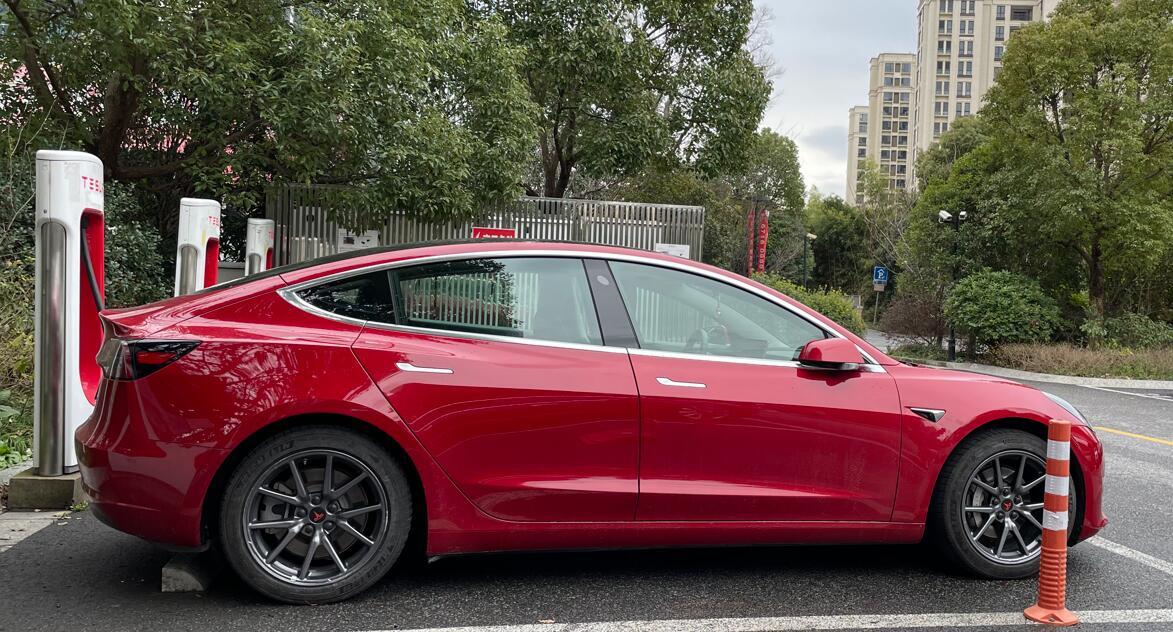The NIO ET5 Touring offers more trunk space while improving the high driver's seat that the regular ET5 was complained about. The key now is the price.

(Image credit: CnEVPost)
NIO (NYSE: NIO) will hold a launch event for the ET5 Touring starting at 19:00 Beijing time on June 15, and the model is already allowing visitors to experience it in its stores before then.
As of June 10, the ET5 Touring show cars are available at 248 NIO stores in 48 cities across China. In Shanghai, where NIO's global headquarters is located, the model is already available at 10 NIO Houses and 15 NIO Spaces.
I went to one of the NIO Houses in Shanghai's Pudong New Area on Sunday, June 11 at around 9 am to check out the model and left at around 10 am.
The store is located in a large shopping district and the office hour start time was 10:00 am. Even though I visited before then, the store staff allowed me to enter.
NIO is one of the strongest local car companies in terms of abilities to build beautiful models, and the ET5 Touring is clearly another well-designed one.

(Image credit: CnEVPost)
It's worth noting that photos of a car give a very different feeling than seeing it in person, and this applies to all models of all brands.
The gray ET5 Touring in the NIO House I visited has very natural body lines. In fact, a non-offensive exterior design is already the basis for a car that is acceptable to most people.
I don't want to discuss too much about its appearance, but you can get a general impression through the pictures in this article.
It should be noted that just a few years ago, for the average Chinese consumer, family cars consisted only of sedans and SUVs, and derivatives of sedans were not considered. You also hardly ever saw a gasoline-powered touring or shooting brake model on the streets of Shanghai.

(Image credit: CnEVPost)
Geely's premium electric vehicle subsidiary Zeekr is the first of the local brands to try to tap into the sedan derivative market, announcing the all-electric Zeekr 001 shooting brake on April 15, 2021, with deliveries starting in October 2021.
The Zeekr 001 is Zeekr's first model, and it is a brave move to target an unproven market. The model delivered 11,337 units last December, bringing full-year 2022 deliveries to 71,941 vehicles.
The ET5 Touring, a derivative of the regular ET5 sedan, is equipped with the same powerful assisted driving hardware as NIO's other NT 2.0 platform-based models, including a roof-mounted LiDAR, and four NVIDIA Orin SoCs capable of delivering a total of more than 1,000 TOPS of performance.
One of the biggest attractions of the ET5 Touring compared to the regular ET5 is the larger trunk space. Such models give consumers the same driving experience as a sedan while gaining load capacity close to that of an SUV.

(Image credit: CnEVPost)
The ET5 Touring is not yet available for test drives, and NIO will officially launch the model on June 15, with test drives available on that day.
For the regular ET5, many owners have complained about the high seating position in the driver's seat, which may be a deterrent for some potential customers to choose this model.
I got into the driver's seat of the regular ET5 at that NIO House and found that this issue was indeed apparent, especially when compared to my own Tesla Model 3 Long Rang, a 2020 purchase.
The regular ET5 feels very much like the driver is sitting in an SUV, even with the seat position cranked all the way down. For the Model 3, on the other hand, the appropriate seating position for me is with the seat height cranked to the middle gear.
NIO has obviously learned this lesson from the regular ET5, and the ET5 Touring driver's seat has a significantly lower seating position. The feeling of sitting in the ET5 Touring driver's seat is almost the same as when I drove my own Model 3.

(Image credit: CnEVPost)
The ET5 sedan seems to have been experiencing demand issues after China's purchase subsidies for new energy vehicles (NEVs) expired at the end of last year, and the price will be critical for the ET5 Touring to make the ET5 family shine again.
Earlier today, NIO announced an RMB 30,000 ($4,200) price cut for the entire new model lineup, effective immediately, but the previously free battery swap service several times a month has become a paid option.
Under the latest pricing system, the starting price of the ET5, including the battery, is reduced to RMB 298,000. If consumers choose to lease the battery using the BaaS (battery as a service) option, the starting price of the vehicle is RMB 228,000.
For the ET5 Touring, many expect that its starting price in China, including the battery, will likely be RMB 10,000 to 20,000 higher than the regular ET5.
In addition to targeting the new sedan derivative market in China, NIO also hopes to sell the ET5 Touring in Europe, where such models have a higher acceptance.
A few hours after the ET5 Touring's China launch, NIO will hold a European launch event on June 16 at 1:00 am Beijing time (June 15 at 1:00 pm US Eastern time) to launch the ET5 Touring, as well as the EL6, known as the ES6 in China.
BREAKING: NIO cuts starting prices by $4,200 for all models and makes battery swap benefits optional
($1 = RMB 7.1415)


(Image credit: CnEVPost)
The post Store visit: First impression of NIO ET5 Touring before official launch appeared first on CnEVPost.
For more articles, please visit CnEVPost.

















